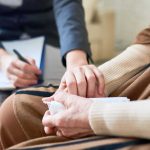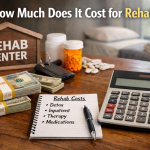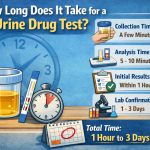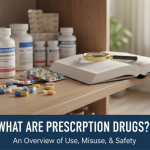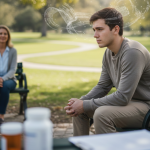One of the largest problems in our society today is drug addiction. The use of substances does not only have an impact on individuals who have an addiction, but also on their families, friends, and communities. Most individuals are caught in a loop of overuse even after being aware of the damages that it causes. It is not easy to break free, but professional help can help. Through the help of trained professionals, a person receives the means, resources, and support to lead a drug-free life.
At Solutions Healthcare in Florida, we realize that addiction affects all aspects of an individual life including mental, physical, social, and professional. This is why we offer evidence-based, caring care that is designed to meet you at your level of recovery.

Why Choose Our Drug Rehab Program in Florida?
Our rehab drug program emphasizes long-term recovery by using customized treatment programs. When medical science is used in conjunction with holistic methods, we will also deal with the causes of addiction and help the patient achieve permanent cessation.
Our program includes:
- Medical assistance during the process of detox (where imperative)
- Co-occurring disorders treatment.
- Evidence-based treatment including CBT and DBT.
- One to one and group counseling.
- Relapse prevention planning.
- Support and involvement of the family.
- Postdischarge and continuous recovery support.
Signs and Symptoms of Drug Addiction
Early identification of drug addiction can enhance the treatment results. The symptoms can be of physical, behavioral and psychological nature.
Physical Symptoms
- Obvious gain or loss in weight.
- Poor hygiene and appearance
- Red or bloodshot eyes
- Track marks on the skin
- Nosebleeds (due to drug use in nose) often.
- Sleep and appetite changes
- Constant tiredness or previously unknown diseases.
Behavioral Symptoms
- Lack of care at work, school or home.
- Nausea or loss of interest in interests or social activities.
- Breaking of family and friendship ties.
- Drug spending problems.
- Covering up or concealing substance use.
- Risky behaviors, which include driving under the influence.
- Laws related to drug use.
Psychological Symptoms
- Irritability, anxiety or depression.
- Explosive temper or emotional irregularity.
- Sense of despair or uselessness.
- Diminished pleasure in previously enjoyed things.
- Paranoia, hallucination or delusion (more so with hallucinogenic drugs)
- Treatment of Drug Addiction.
Drug Addiction Treatment Options
Inpatient/Residential Treatment
The inpatient program is a live-in, 24/7 structured program. Inpatient rehab is ideal for those who have relapsed, those who have trouble with outpatient treatment and those with co-occurring disorders in that, it integrates treatment, group support, whole-body healing techniques such as meditation and yoga.
Therapeutic Approaches
- Cognitive Behavioral Therapy (CBT): It will help them to challenge their self-destructing thoughts and acquire healthy coping strategies to cope with cravings, stress and relapse triggers.
- Dialectical Behavior Therapy (DBT): Helps people with emotional regulation issues and teaches them how to be aware of themselves and how to handle difficult situations.
Medication-Assisted Treatment (MAT)
Taking drugs along with therapy is the best way that some people can choose. The drugs such as methadone, buprenorphine, or naltrexone can decrease cravings, especially in the case of opioid and alcohol addiction, as the patient works on their recovery.
Personalized Treatment Plans
Each patient is assigned a personalized program according to his or her needs, substance history, and general health.
Key steps include:
- Evaluation/ Assessment Medical history, mental health and substance use reviews.
- Family Involvement: Education and counseling to assist the family to participate in healing and restoring of trust.
- Relapse Prevention: identifying stressors, peer influence and emotional stimuli, and learning strategies to stay drug-free.

Take the First Step Toward Recovery Today
You need not fight addiction on your own. Our mission at Solutions Healthcare in Florida is to help you or your loved one move toward long-term recovery with compassion, expertise, and individual care.
Call us now (386) 866-3600 to make a confidential appointment.
Frequently Asked Questions About Drug Addiction Treatment
1. What are the 5 treatment options for drug addiction?
The five major treatments include:
- Detoxification (medical help to deal with withdrawal)
- Inpatient/Residential Treatment
- Outpatient Programs
- Behavioral Therapies (CBT and DBT)
- The Assistance of Medication Treatment (MAT)
2. What is an example of a drug treatment program?
One such program is an inpatient rehabilitation program where the patient is staying at the rehab center, is medically detoxed where necessary, undergoes counseling sessions, and engages in group and holistic therapies to facilitate whole-healing.
3. What is the most successful treatment for addiction?
A combination of behavioral therapies (such as CBT), family engagement, and Medication-Assisted Treatment (MAT) can be the most effective type of treatment in many cases. When the care is tailored to the specific needs of an individual, success is enhanced.
4. How long is a drug treatment program?
The duration varies according to the type of program and the needs. Inpatient rehab can take 30-90 days and outpatient program can take several months. The process of permanent recovery also involves relapse prevention and long term aftercare.
5. How do drug treatment programs work?
The drug treatment programs offer systematic assistance to assist people in overcoming the addiction. Typical initial stages include assessment and detox followed by therapy, counseling, relapse prevention and aftercare planning to establish a long-term recovery.







